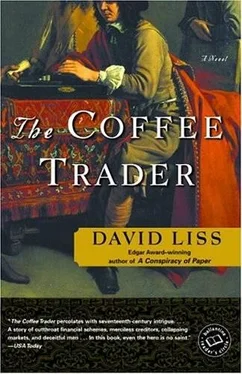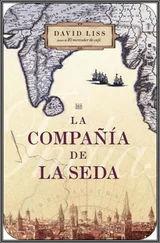“Who’s the fellow you’re looking for?”
“His name is Joachim Waagenaar.”
“Waagenaar.” The Dutchman laughed. “Your friend’s made a reputation for himself in as short a time as any. They got him rasping away even after most have finished for the night, and if he don’t meet the demands they’ve set, he’ll find his way to the Drowning Cell soon enough.”
“I’m sure he’s difficult enough, but I must speak with him.” Miguel pressed another coin into the Dutchman’s palm. Best to keep the wheels greased.
The fellow set down his candle upon a rough wooden table. “Speak with him?” he asked. “That cannot be. There are hours for visiting and there are hours for not visiting. Begging your pardon, I had meant to mention that before, but I must have forgotten myself.”
Miguel sighed. The money, he reminded himself, was nothing. In a few months’ time, he would laugh at these little expenses.
He reached into his pocket and withdrew the last coin he had tucked there: five guilders. The noseless Dutchman pocketed it and disappeared from the room, locking it from the outside. A cold panic spread through Miguel, and when no one had returned for nearly a quarter of an hour, he began to wonder if perhaps he had become the victim of some horrible trick, but then he heard the door unlatch, and the Dutchman entered, pushing Joachim before him.
Each time Miguel saw Joachim, the fellow was the worse for it. He had lost weight since their last meeting and had now grown sickly gaunt. His hands and arms and much of his face were stained red from sawing at brazilwood, so that he looked more like a murderer than a penitent in a house of correction.
“You don’t mind that I’ll listen to your conversation,” the Dutchman said. “I have to make certain nothing improper happens here.”
Miguel did mind, but he sensed at once that he would have little success removing the fellow, so he simply nodded.
“To what do I owe the pleasure of this visit, senhor?” Joachim’s voice sounded even, devoid of sarcasm. He wished to play at formality.
“I must know what you have said to the Ma’amad. Have you sent a note? Is that how you communicated from these walls? I must know.”
Joachim’s lips curled just slightly. “How badly would you like to know?”
“I must have the answer. Tell me precisely what you revealed to them, every word. I have no time to play games.”
“No games. You’ll not have the answer of me in here. They have cast me in, and I may not even know the length of time I am to be a prisoner, nor even my crime, other than I did not wish to work as their slave. So I say that if you can get me from this prison, I’ll tell you all I know.”
“Get you out?” Miguel nearly shouted. “I am no magistrate to get you out. How do you propose I do such a thing?”
The noseless Dutchman coughed into his fist. “These things may be ordered, if one but knows how. Not for every man, but for those thrown here without a crime save only vagrancy.”
Miguel sighed. “Very well,” he said. “Speak plainly.”
“Oh, I think twenty guilders should do the business.”
Miguel could scarce believe that he was now prepared to bribe a guard twenty guilders to free from the Rasphuis an enemy he very recently would have paid a much larger sum to have cast in. But Joachim knew why the Ma’amad had summoned him, and he would consider such information acquired cheap at twenty guilders.
Miguel peered into his purse, embarrassed that the guard now discovered he had apportioned out his money into different piles. He had only a little more than what was required.
The guard counted out the coins. “What is this? Twenty guilders? I said forty. Do you think me a fool?”
“Surely one of us is a fool,” Miguel replied.
The guard shrugged. “I’ll just take this fellow away, then, and we’ll say no harm done.”
Miguel opened his purse once more. “I have only three and a half guilders remaining to me. You must take that or nothing.” He handed it to the guard, hoping that by so doing he would seal the bargain.
“Are you sure you have no more purses or pockets or piles about you?”
“This is all I have, I promise you.”
His words must have conveyed an element of truth, for the Dutchman nodded. “Get on with you,” he said. “I won’t have you loitering in front of the premises.”
They took a few steps in silence. “I can’t thank you enough,” Joachim then began, “for this kindness.”
“I should have been happy to see you rot there,” Miguel murmured, as they passed through the courtyard, “but I must know what you said to the Ma’amad.”
They stepped into the Heiligeweg, the guard closed the door behind them, and the series of locks and bolts echoed into the street. “I must first ask you a question,” Joachim said.
“Please, I have little patience. It had better be relevant to these matters.”
“Oh, it is. It could not be more relevant. My question is this.” He cleared his throat. “What the Christ is a Ma’amad?”
Miguel felt an ache in his skull gathering force, and his face grew hot. “Don’t play the fool with me. It is the council of Portuguese Jews.”
“And why should I have ever spoken to so august a body?”
“Did you not tell me before that you would tell me what you know?”
“I did promise, and I have kept my promise. I know nothing of your ruling council, though I believe I now know something of it. I know that you fear I should speak to it.”
“Damn you, you scurvy devil,” Miguel spat. He felt his fist clench and his arm tighten.
“It is all the more shame to you that you should need to be tricked to rescue an old associate from so horrible a fate as the Rasphuis. But you will find me not without gratitude. I’ll thank you now and be on my way.” Joachim bowed deeply and then ran into the night.
It took a moment before Miguel could begin to collect his thoughts. He could not even allow himself to consider how he had just humiliated himself before his mad enemy. It was of far more importance that the Ma’amad had called him forward and he did not yet know why. If it had not been Joachim who had reported him, this appearance must be the work of Parido. The spies he sent to Rotterdam had seen nothing they could use. Was it the matter of Joachim in the street with Hannah and Annetje? Perhaps, but they could hardly excommunicate him if he had a good explanation. He was certain he could think of one before morning.
Miguel was out of bed before first light. After urinating furiously from the coffee he’d taken before bed-to keep his thoughts active in his sleep-he washed and said his morning prayers with a kind of pleading enthusiasm. He dressed, ate a breakfast of bread and dried cheese, and hastily drank a large bowl of coffee.
Last night, he had been driven by desperate need to do something to further his cause, but in the silence of his room he could not escape the hard ball of fear that tightened in his belly. This was no ordinary summoning. There would be no indulgent lectures on the importance of the dietary laws or on resisting the charms of Dutch girls.
Could he really turn his back on everything as Alferonda had done? Instead of remaining in Amsterdam, a usurer and a known villain, Alonzo could easily have gone elsewhere, changed his name, settled into another community. There were other Jews in the world besides those in Amsterdam, and Miguel need not remain here. But the cherem would mean more than having to choose between being a Jew elsewhere and an outcast in Amsterdam. To leave the city would mean abandoning his plans in the coffee trade, abandoning the money Ricardo owed him. If he stayed, his creditors, no doubt including his sanctimonious brother, would descend upon him and pick his bones clean. Even if he did move to a city where no one knew him, how would he live there? A merchant without connections was no merchant at all. Was he to be a pushcart peddler?
Читать дальше












